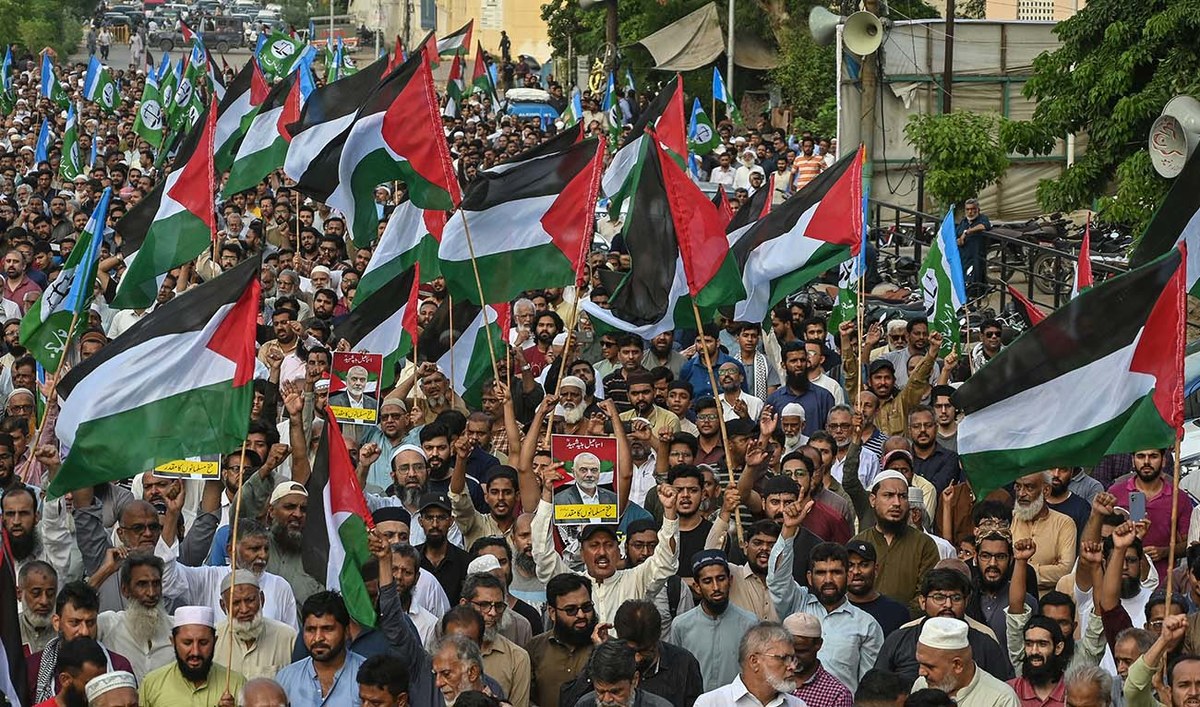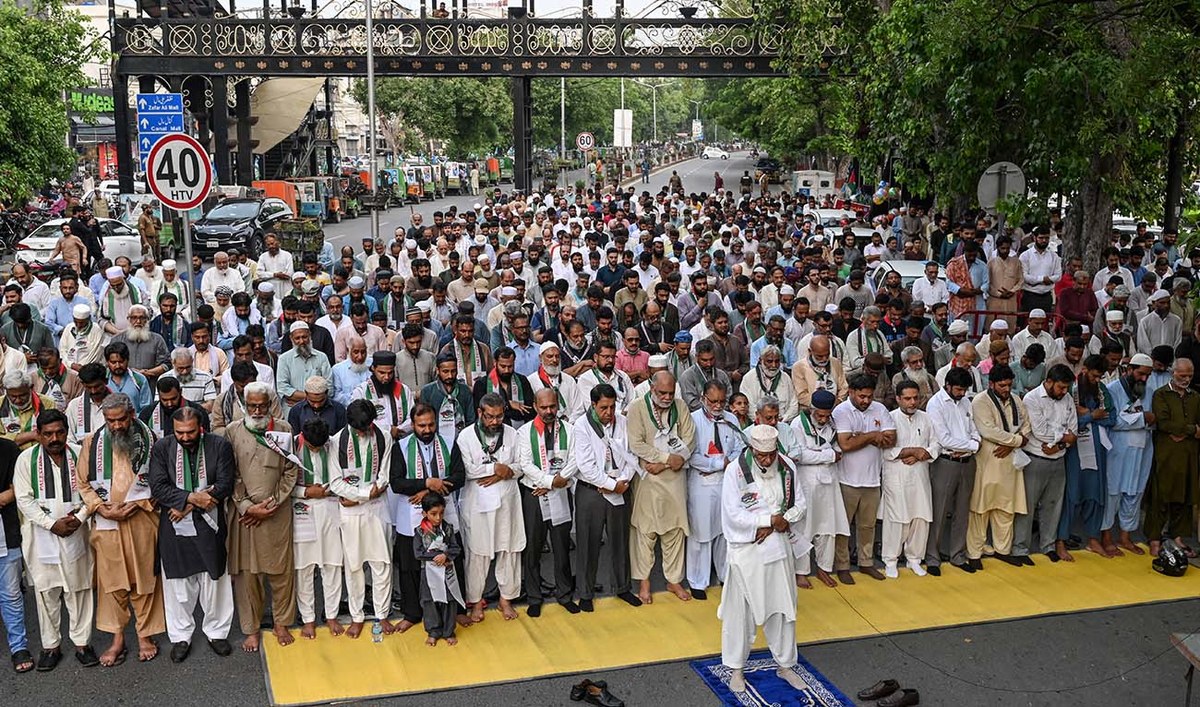ISLAMABAD/KARACHI: Pakistan on Wednesday condemned the assassination of Hamas leader Ismail Haniyeh in Tehran, expressing shock over the “reckless act” that coincided with the new Iranian president’s oath-taking ceremony as thousands attended his funeral prayers in absentia in the southern port city of Karachi.
Iran’s state television announced the killing of the Palestinian leader early Wednesday. The Iranian Revolutionary Guards said Haniyeh and a security guard had been ambushed in their place of residence and an investigation was underway.
Haniyeh was in Iran for the swearing-in ceremony of the newly elected reformist president Masoud Pezeshkian.

Activists and supporters of Jamaat-e-Islami (JI) party carry Palestinian flags as they attend an absentia funeral prayers for Hamas chief Ismail Haniyeh in Karachi on July 31, 2024, after his assassination in an air strike. (AFP)
“Pakistan condemns the assassination of Ismail Haniyeh, the Chief of Hamas Political Bureau in Tehran today,” the foreign office said in a statement, sending condolences to his family and the people of Palestine.
“We are deeply shocked by the timing of this reckless act, coinciding with the inauguration of the President of Iran, an event attended by several foreign dignitaries, including the Deputy Prime Minister of Pakistan.”
The foreign office expressed “serious concern” over what it described as “growing Israeli adventurism in the region.”
“Its latest acts constitute a dangerous escalation in an already volatile region and undermine efforts for peace,” the statement said.
Separately, Jamaat-e-Islami (JI) chief Hafiz Naeem-ur-Rehman, who heads a major Pakistani religious political party, announced funeral prayers in absentia for the “martyred” 62-year-old Hamas leader in Karachi on Wednesday.
FUNERAL PRAYERS IN ABSENTIA

Activists and supporters of Jamaat-e-Islami (JI) party offer absentia funeral prayers for for Hamas chief Ismail Haniyeh in Lahore on July 31, 2024, after his assassination in an air strike. (AFP)
Thousands gathered at the city’s busy New M.A. Jinnah Road for the funeral prayers to pay tribute to the Hamas leader.
Muhammad Hussain Mehnati, the head of the party’s Sindh chapter, said conscientious people worldwide should reject Israel’s occupation of Palestinian land.
“Ismael Haniyeh and other Palestinian leaders among tens of thousands sacrificed their lives in the glorious struggle,” he noted.
Mehnati praised the “ongoing Palestinian resistance against tyranny,” criticizing the US, the UK, and other nations for supporting Israel.
“I urge the Pakistani government and other Muslim-majority countries to actively assist the oppressed Palestinians,” he said.
The JI, which is holding a sit-in protest against inflation and rising energy costs, had planned to hold another demonstration in front of the Governor’s House in Karachi on Wednesday.
However, it called off the protest, urging residents to attend Haniyeh’s funeral prayers in absentia.
The event was also attended by a large number of women. One of the participants, Dr. Hareem Khurshid, praised Haniyeh for resisting Israel’s military campaign and credited him for protecting the Al-Aqsa Mosque.
“We are happy because he embraced martyrdom and at the same time we are sad,” she told Arab News. “But we will never stop protesting and raising our voices for Palestine.”
INCREASING HOSTILITIES IN MIDDLE EAST
Haniyeh’s assassination comes amid an escalation of hostilities between Israel and Lebanon’s Hezbollah, which was blamed for an attack on the Israel-annexed Golan Heights that killed 12 children on the weekend.
On Tuesday night, Israel struck a Hezbollah stronghold in southern Lebanon, saying that it had killed Fuad Shukr, the head of Hezbollah’s military operations room.
Israel has promised to wipe out Hamas after the group conducted a deadly raid into settlements outside the Gaza Strip on Oct. 7, killing around 1,200 people and taking hostages back to the Palestinian enclave.
Israel soon after launched a devastating military assault in Gaza and has since killed over 40,000 people, mainly civilians. Both sides have been trying to negotiate a hostage release agreement, which would include a cessation of fighting, with the help of the US and regional negotiators.
Haniyeh, normally based in Qatar, has been the face of Hamas’s international diplomacy as the war set off last year. Hamas said in a statement Haniyeh’s killing would “take the battle to new dimensions and have major repercussions,” while Iran also vowed to retaliate.
Iran’s Supreme Leader Ali Khamenei said Israel had provided the grounds for “harsh punishment for itself” and it was Tehran’s duty to avenge the Hamas leader’s death as it had occurred in the Iranian capital. Iranian forces had already made strikes directly on Israel earlier in the Gaza war.
There was no comment nor claim of responsibility from Israel. In 2021, Israel assassinated Mohsen Fakhrizadeh, Iran’s top nuclear scientist.













